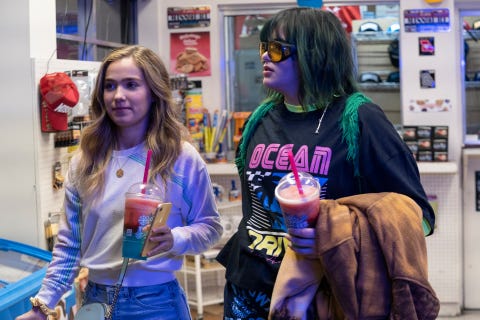When I was a freshman in college, I drove with my friend to the nearest Planned Parenthood so she could get birth control for the first time. I remember it being
mostly uneventful, though she was nervous, and the protestors situated outside the center didn’t help. It was comforting to know that if anything happened during my four years in school, at least I could come here. I was grateful to live so close to one of the few remaining abortion clinics in the state of Missouri.
But in 2018, that Planned Parenthood, located in the city of Columbia, had to stop providing abortions due to controversial state requirements that abortion providers must have admitting privileges at nearby hospitals. That left Missouri with just one abortion provider in the entire state, two hours away from my alma mater.
It’s this same clinic that Veronica, the 17-year-old high-achieving Missouri high schooler at the center of HBO Max’s new film Unpregnant, could have gone to—if state law didn’t require parental consent for anyone 17 or under to receive an abortion. Instead, Veronica’s quick Google search reveals she must drive 900 miles from Columbia to Albuquerque, New Mexico to get a procedure without her religious parents finding out.

Though it sounds intense, the truth is that the movie, starring Haley Lu Richardson (Five Feet Apart) as Veronica and Barbie Ferreira (Euphoria) as her former-best-friend-turned-companion Bailey, simply isn’t. Rachel Lee Goldenberg (Valley Girl) directs a buddy comedy, a classic road trip adventure based on the book by Jenni Hendriks and Ted Caplan; it’s mostly light and fun and colorful, a far cry from most abortion documentaries or dramas, like this spring’s Never Rarely Sometimes Always. Veronica and Bailey must make it to New Mexico and back in a weekend, working with a tight budget and years of friendship baggage. At one point, Bailey makes out with Kira, a race-car-driving Betty Who, in the middle of a fun house while Maggie Rogers’ “Alaska” plays in the background. There is joy here.
But this is still a movie about abortion, and more pointedly, it is an hour-and-forty-five-minute metaphor about the literal hoops people must jump through in order to obtain a routine procedure. For Veronica, this includes, but is not limited to, securing the money to go (including popping coins out of her state quarter map), finding a car, making an appointment for a surgical procedure (not a pill, because even though she qualifies for one, she can’t attend the required follow-up appointment), and sleeping outside in lieu of a hotel room—ironically, next to a gigantic wooden cross. The movie’s “villains” are two white Christian anti-choice activists, one of whom ends up chasing them down the street in a mobile crisis pregnancy center, lecturing them about (disproven) abortion side effects from a loudspeaker.

At one point, after failing to jump onto a moving train so the two can make it to the clinic on time, Veronica yells, “I should not be here. I should be able to just walk down the street and open a door and waltz right in and say, ‘Hello, my name is Veronica. My boyfriend is an asshole. Here’s my $500. Oh, oh yes, I would love a cup of water. Thank you so much, that’s so sweet of you.’ But no, nope.” She continues, “Why in the hell do you need to get parental consent to have an abortion but not to actually birth a human child? Fuck you, Missouri state legislature.”
It’s more than worth mentioning that Veronica is a white, privileged student on her way to Brown in the fall, and abortion laws like the ones in Missouri disproportionately impact low-income people and people of color who might be unable to drive across state lines for days for the procedure. (It’s also more than worth mentioning that the three people who go out of their way to help Veronica and Bailey make it on time are all people of color.) But as Bailey puts it during their mid-trip fight: “Veronica, you are exactly the kind of person who gets an abortion and then doesn’t tell anyone.”

The two get to the clinic eventually, and keeping with the film’s non-judgmental tone, the procedure is shown as calm and straightforward; Veronica walks out, says she feels relieved, then immediately eats a plate of nachos. Her mom finds out, and while she says she doesn’t understand her daughter’s choice, she still loves her, a rare happily-ever-after in the abortion film genre.
Though it occasionally dabbles in the hyperbolic (Veronica tasing Bailey’s dad, for example), so much of Unpregnant is grounded in reality. There’s a crisis pregnancy center across the street from the Columbia clinic, and I’ve been on enough midwest road trips to recognize the endless miles of farmland and billboards. And even if it’s unintentional, it feels right to begin this story in Columbia, a blue dot in a red state still affected by the decisions made at a capitol miles away.
At one point, Bailey and Veronica find themselves at a fairground, screaming out their secrets on a twisty carnival ride. Veronica, a main character in an HBO movie, yells out: “I’m pregnant! And I’m getting an abortion!” I haven't seen enough of that.
Unpregnant is streaming now on HBO Max.



